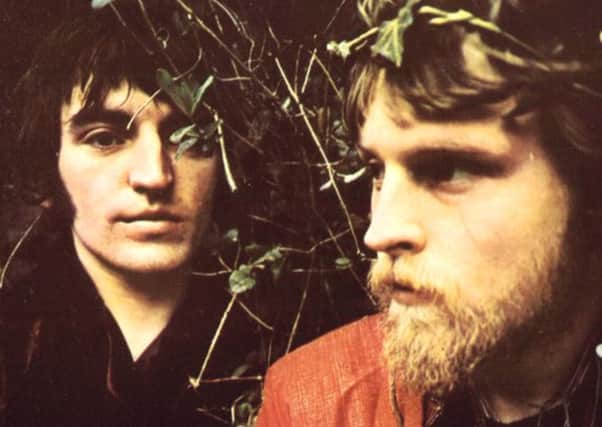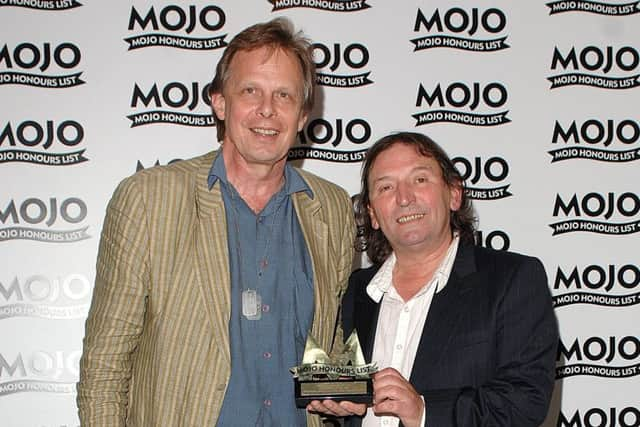International Festival: The Incredible Journey of the Incredible String Band


Joe Boyd, to this day still the urbane American about London, has always been a champion of the freaks and the weirdos. In the mid-to-late 1960s, he was in the thick of the UK counter-culture, working first for Elektra Records and then setting up his own music management stable, Witchseason, from where he helmed the careers of folk fusion pioneers Fairport Convention and an ethereal duo from Edinburgh who, on their first five albums at least, did their best to live up to their designation as the Incredible String Band.
ISB were one of the biggest cult acts to emerge from the hippy scene and remain one of the most ardently admired groups that Scotland has ever produced, yet Boyd has lamented that they enjoy the “highest ratio of past success to current anonymity”.
Advertisement
Hide AdAdvertisement
Hide Ad“You go into record shops and look at the box sets of 1960s music stacked up by the cash register and it’s the Complete Who or Complete Doors, Complete Beatles, Complete Dylan – you never see the Complete String Band there,” he says. “But back in ’68 and ’69, particularly in America, they were huge.”


Boyd is hoping to redress that deficit slightly by paying tribute to ISB on the world stage that is the Edinburgh International Festival. Very Cellular Songs: The Music of the Incredible String Band is set to be one of the most social events in the Festival’s contemporary music strand, with the distinction of a surviving String Band player in the massed line-up.
While founder member Clive Palmer passed away in 2014, and multi-instrumentalist Robin Williamson is not in the business of looking back on his career, his partner Mike Heron still tours, performing selections from the ISB back-catalogue. “I’m quite comfortable with paying tribute to what the String Band was,” he says.
Joining Heron on stage in his native Edinburgh will be esteemed jazz and folk bassist Danny Thompson, who Boyd describes as “the first person on the teamsheet”, current folk favourites Karine Polwart, Sam Lee, Alastair Roberts, plus Scottish soprano Janis Kelly, who grew up singing ISB songs, Robyn Hitchcock, who “grew up with his nose pressed against the glass of the Sixties” and Scritti Politti mainman Green Gartside, who grew up sporting a gold earring in emulation of Robin Williamson. Other guests include singer Barbara Dickson and violinist and composer Greg Lawson. It’s a grown-up celebration of a free-spirited group.
The roots of Incredible String Band are lovingly documented in Heron’s recently published book, You Know What You Could Be, a beautiful joint memoir with the poet Andrew Greig, who writes from a fan’s perspective and wonderfully captures the appeal of these exotic beatniks to a lad from small-town Fife.


Heron himself was similarly wide-eyed when he first encountered Robin Williamson and Clive Palmer playing together in the Crown Bar, a hub for Edinburgh’s folk scene in the 1960s. “I was in rock bands at the time,” he recalls, “but I used to take Tuesday off so I could go and watch what was happening there and I was very smitten and wanted to be part of it. Clive was a real beatnik, he’d been on the road for ten years or so. I was impressed and, though I was living with my parents, quite fancied being a beatnik myself.
“Edinburgh is quite a restrained town, at that time particularly. But every year when the Festival came round it suddenly became a really interesting town and all these people came from America and various places. Ravi Shankar came every year and did a concert roughly at the Festival time, and I went to see people like George Melly.”
Advertisement
Hide AdAdvertisement
Hide AdAlso in the crowd at the Crown was a young Joe Boyd, recently transplanted from Massachusetts and on the hunt for grassroots musical talent.
“I thought Robin was a star, the way he played guitar was different from anything I’d ever heard before, there was a freedom and virtuosity. I was used to people who’d learned exactly how to play the right kind of bluegrass banjo, these obsessives who really mastered a particular traditional style, and hearing Robin and Clive, they obviously knew how to play traditional music in the traditional way but they were using it as a jumping-off point to go out into something stranger. It was like these strathspeys and reels had taken a side detour to the Atlas Mountains.”
However, the nascent String Band were to prove elusive when Boyd returned to Scotland with Elektra chequebook in hand. He made his way to Clive’s Incredible Folk Club, a legendary all-night shindig in a warehouse space on Glasgow’s Sauchiehall Street, only to arrive as the police locked the club down for good. Eventually he tracked them to Temple Cottage on the outskirts of the city, where folk fan Mary Stewart operated an open house for musicians. By this point, Heron had been invited to join the group, and he and Williamson had started writing original material.
“I wasn’t that big a fan of this new vogue for everybody being singer/songwriters, and so my heart kind of sank,” says Boyd. “But Robin picked up his guitar and played October Song and I just about fell over. I thought it was fantastic. I was just stunned from the beginning.”
Palmer took off travelling after the recording of the debut album, leaving Heron and Williamson to experiment with an array of world instruments. Boyd, meanwhile, took on the job of managing the band. He also captured the burgeoning psychedelic rock scene in London by founding the seminal UFO club, frequented by The Beatles, Yoko Ono, Pink Floyd and the String Band themselves.
“All the freaks would go,” Heron says, “and they didn’t really categorize what they liked as long as it was great to take acid to, so they had The Move, Pink Floyd and sitar players all through the night and everyone just accepted it and become part of it. We fitted right into that scene.”
The Rolling Stones, Paul McCartney and David Bowie were all admirers of the String Band, who were at the peak of their powers in the late 1960s, thanks to their acclaimed psychedelic folk albums, The 5000 Spirits or the Layers of the Onion and The Hangman’s Beautiful Daughter.
Advertisement
Hide AdAdvertisement
Hide Ad“It’s not outlandish that they should be mentioned in the same paragraph as some of the biggest stars of that period but there were other aspects of the Sixties that people find more appealing,” says Boyd.
To his eternal chagrin, Incredible String Band’s Woodstock performance was not included in DA Pennebaker’s celebrated film of the festival which immortalised so many of the artists of the day. The group trucked on for another five years but found themselves increasingly out of step with the bombast of the 1970s stadium rockers, eventually splitting in 1974. There was a brief reunion in the late 1990s, but mostly their singular sound is preserved for future generations through their adventurous recordings.
Heron, however, has a more sanguine take on the cult appeal of his former band. “It’s always been a minority interest,’ he says. “The String Band is a Marmite thing – you either love it or you hate it.”
*Very Cellular Songs: The Music of the Incredible String Band, Edinburgh Playhouse, 17 August, 0131-473 2000 / www.eif.co.uk